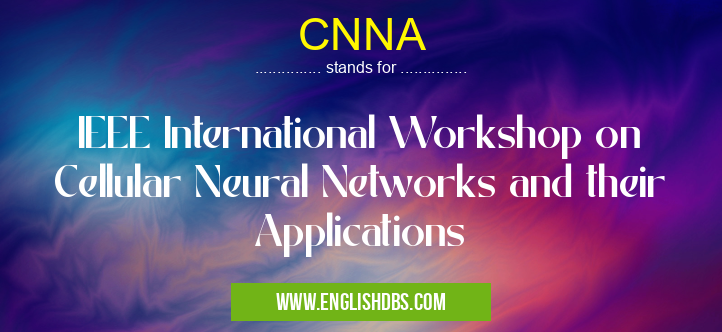What does CNNA mean in CONFERENCES
CNNA stands for IEEE International Workshop on Cellular Neural Networks and their Applications. It is a workshop organized by the Institute of Electrical and Electronics Engineers (IEEE) to promote research on cellular neural networks and their applications. Cellular Neural Networks (CNNs) are a special kind of artificial neural networks that use locally interconnected neurons in array-like structures to create complex dynamic behaviors. CNNs are inherently parallel, making them suitable for massively parallel architectures such as clusters of computers or mobile devices. Furthermore, CNNs can process large datasets quickly due to their low computational complexity and low power consumption properties. The IEEE International Workshop on Cellular Neural Networks and their Applications was established in 1995 with the aim of providing a platform for researchers to discuss new developments in the field, exchange ideas, and develop collaborations.

CNNA meaning in Conferences in Community
CNNA mostly used in an acronym Conferences in Category Community that means IEEE International Workshop on Cellular Neural Networks and their Applications
Shorthand: CNNA,
Full Form: IEEE International Workshop on Cellular Neural Networks and their Applications
For more information of "IEEE International Workshop on Cellular Neural Networks and their Applications", see the section below.
» Community » Conferences
Purpose of CNNA
The purpose of this workshop is to provide an opportunity for researchers from diverse backgrounds who are interested in cellular neural networks (CNNs) and their applications, including academics, industry professionals, users, vendors etc., to discuss current trends and challenges in the field of cellular neural networks. Specifically, topics covered include recent advances in algorithm design techniques for CNN implementations; theoretical foundations; hardware architectures; system architectures; performance analysis; application areas such as digital signal processing; video coding; pattern recognition; image processing; communications protocols etc.; embedded systems applications especially focusing on specific biological or industrial requirements using CNN theory or technologyxxxxxx .
Essential Questions and Answers on IEEE International Workshop on Cellular Neural Networks and their Applications in "COMMUNITY»CONF"
What is IEEE International Workshop on Cellular Neural Networks and their Applications?
IEEE International Workshop on Cellular Neural Networks and their Applications (CNNA) is an international workshop devoted to the study of cellular neural networks (CNNs). It is organized by the Technical Committee on Model-based Image Processing, Machine Learning and Control of IEEE Signal Processing Society.
What topics are discussed at CNNA?
Topics discussed at CNNA include the architecture of CNNs, their analog VLSI implementations, learning algorithms for CNNs, applications of CNNs in image processing, robotics, control engineering and machine learning.
What are the goals of this event?
The main goal of this event is to provide a platform for researchers from both academia and industry to exchange ideas about the recent advances in the topic of cellular neural networks. Additionally, it provides insights into potential uses and applications of CNNs in various domains.
How can I become a participant in CNNA?
To become a participant in CNNA, you need to register using the registration form found on our website. Participants should also submit abstracts or full papers related to research projects or implementations based on cellular neural networks.
What types of submissions does CNNA accept?
CNNAacceptspapersinoriginalworksonaspectsofcellularneuralnetworksrelatedtotheirembeddedapplicationsandimplementations.Italsoreceptspoposalsforworkshopsorpanelsessionsonrelevanttopics.
Does CNNA accept work previously published elsewhere?
No, CNNA only accepts original work that has not been published elsewhere. All submissions will be reviewed thoroughly before acceptance to ensure originality and quality.
Do I need to be affiliated with an organization or institution to participate in CNNA?
While it would be ideal if participants were affiliated with an organization or institution in order to get more out of the event, it is not mandatory for participation. All those who are interested in either submitting papers or attending can do so without any affiliation requirements.
When will abstract submission for CNNA close?
Abstract submission for CNNA typically closes around a month before the start date of the conference; however please keep checking our website as dates can vary year by year depending upon other factors such as location or special events happening alongside CNNA.
Final Words:
The IEEE International Workshop on Cellular Neural Networks and their Applications (CNNA) is an important event that brings together international experts from diverse fields who have an interest in developing new approaches using cellular neural networks at the forefront of modern engineering technology applications. By exchanging ideas through this forum scientists can develop novel solutions that will address existing challenges posed by emerging application areas using massively parallel algorithms like those found in CNN's architecture. Moreover this will bridge new trends between biology based solutions used in industry robotics as well as communication protocols making use CNN based technologies more available than ever before!
